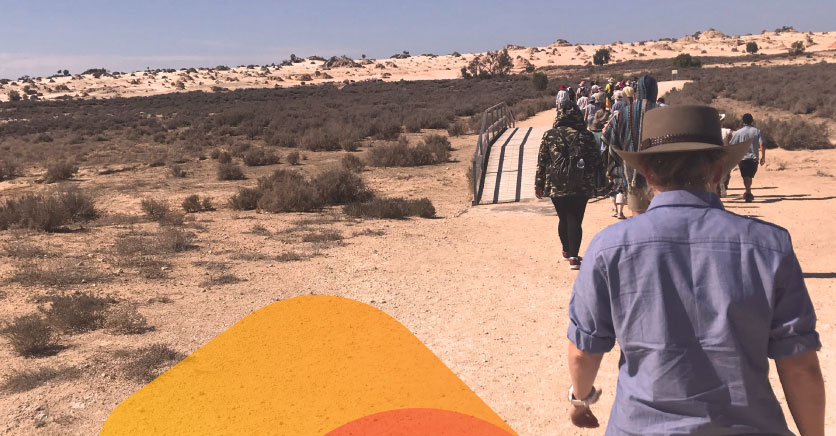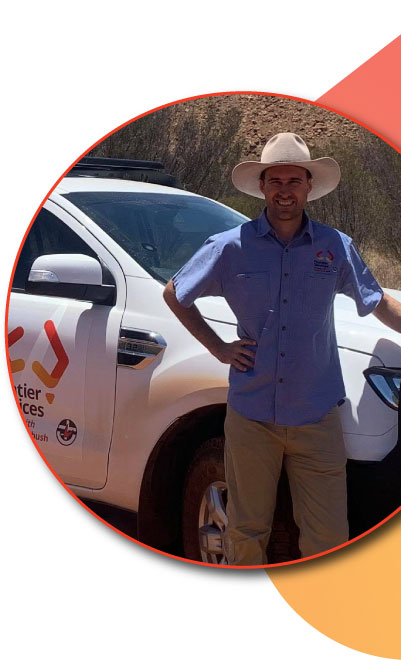
National Reconciliation Week – Benjamin
Benjamin Quilliam is our Bush Chaplain in our Centralian Remote Area. His region includes Alice Springs and surrounds as well as the APY Lands (Anangu Pitjantjatjara Yankunytjatjara) which is home to around 2,300 First Nation people. As we head into National Reconciliation Week next week, (May 27 – June 3), we asked Benjamin to share some of his story and his thoughts on what it ‘In This Together’ means to him.
The APY Lands is large, sparsely populated and located in the remote north west of South Australia. The people speak the Pitjantjatjara language, making English a second or third language for many. According to a report tabled with the South Australian Government in September last year, the APY Lands are home to some of the highest levels of intergenerational disadvantage in Australia.
Benjamin (pictured inset) – or Benj, as he likes to be called – has lived in Alice Springs for four-and-a-half years and been our Bush Chaplain for three. When you speak with Benj about what ‘In This Together’ means for him and his community, the overwhelming message is about confronting hidden biases and learning the facts.
“There are still a lot of cultural and language barriers in this area as well as many inequalities. Even so, there are many things to be learned from our First Nations People. It begins with sitting down and listening to them. Learning about their culture, their language and their beliefs. It’s all about getting to know them.

Benj’s work with First Peoples has focused around chaplaincy and advocacy whenever an individual or their entire community has a need.
“One of the things I’m most proud of is that together, we were able to obtain a dialysis clinic for the people of the APY Lands.
“Many Indigenous people develop renal failure as they get older, and lack of access to dialysis on or near remote Indigenous communities is a big area of concern, not only in Central Australia, but also in the Top End,” says Benj.
“When there is no dialysis available close by, people are forced to move to larger centres like Alice Springs, Darwin and Adelaide, which leaves a vacuum of elders on country and this can significantly impact on the community.”
Did you know?
Before European settlement, Australia was divided into more than 500 different clan groups or ‘nations’, many with distinctive cultures, beliefs and languages.
Could differences in educational resources be adding to intergenerational disadvantage?
“The issue of how language and distance barriers impact the education of our First Peoples is just one that many Australians may not fully understand,” says Benj, who says that like many families living in Australia, some First Nation families do not speak English at home.
This is particularly common in remote Australia, and as a result, when their children start school, they are being taught in an unfamiliar language (English).
“In the city, schools often have educational supports for children with English as their second language. But in remote areas of Australia, where various types of resources are limited, the schools simply don’t have the ability to support children for which English is not their first language, to build their English language skills.
“There may only be one teacher for an entire school, and one person simply can’t do everything,” explains Benj. “Even to attend a Professional Development Day, the teacher may need to travel for 2 days (each way) for a 1-day course. That means the school is closed down for almost a week.”
“This is just another way in which intergenerational disadvantage can play out for our First Peoples in these remote communities.”
In this together
Benj’s hopes for National Reconciliation Week in 2020 to centre around the hope that Australia’s Second Peoples could work to put themselves into the shoes of our First Nation’s people.
“It would be great if we could stop and think critically about what assumptions we have. What it might be like from their perspective.“
Benj suggests that maybe this year, we could really take the time to read about or listen to the perspectives of some First Nation’s people.
“If we think someone’s decisions or actions don’t make sense, maybe it’s time to do some work and find out the thinking behind those decisions. Then we need to find out the thinking behind THAT thinking. Only then, will we be a step closer to understanding.”
